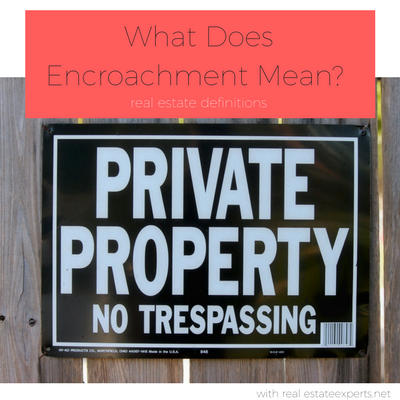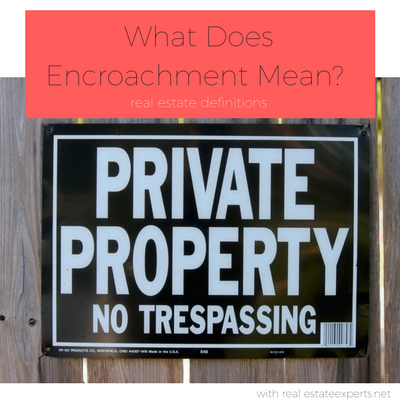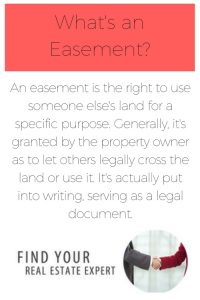You don’t need any “beware of dog” signs. You have legal rights!
Real estate terminology can be tough to grasp. There are a lot of words seemingly interchangeable, when they’re defined very differently. The definition of them can differ greatly, or minutely. Understanding the nuances of the terminology can help you get a fuller understanding of your rights as a home owner, buyer, or seller.
What’s the meaning of encroachment?
The definition of this term is sort of an umbrella. When you think of the word encroaching, you typically think about someone slowly getting in your space. In terms of encroachment in real estate, it means property encroachment. Simply put: trespassing physically or in the building of structures that intrude on your property.
A neighbor builds a shed that looms over your yard. Another neighbor expands their house, the porch seemingly inches away from your living room window. A fence touches your property, carving out some of your land for your neighbors. Your garden is trampled and consequently ruined by people crossing your yard for access to a public space. These are all examples of encroachment.
Even utility companies can encroach on your property. In certain circumstances, they can do this to plant power poles, or similar structures. This is actually called an easement. Many properties have power or sewer easements so that utility companies can access power or sewer lines in the event of an emergency or for some other reason.
But how can this happen if there are private property rights?
The ways encroachment can happen in real estate
Let’s just say this: some people don’t pay attention to boundary lines when they’re building. If you hire a contractor to do the building for you, it’s possible they won’t adhere to the boundary lines of your and your neighbor’s property.
Sometimes, property lines aren’t drawn correctly. Not all surveys are perfect but it is truly rare when they are wrong. This is why it is so important to have a survey in your name. Not only does it protect you against any title insurance survey related problem, it can be used to identify problems before you close on a home or something for a contractor to work from if you are making an improvement to your home or lot. In realty, most of the time homeowners and sellers won’t even notice there’s an encroachment until they try to sell the home. The property survey will show the encroachment issues, though.
Private property disputes have solutions, and settlement occurs in a few ways. However, any encroachment must be documented or cleared before the title of a home can transfer from the seller to the buyer.
What you can do
Before beginning any expansions, updates, or improvements to your home it’s important to get a property survey. If you did not get a survey when you bought your home, it is advisable to get one if you are making improvement, like putting up a fence, that involves your property boundaries. If you find property encroachment during the property survey, you must tell your real estate attorney as soon as humanly possible!
Even though an encroachment is something buyers may be unhappy about, it won’t necessarily break a sale as long as it’s addressed early on. Also, many encroachments are not a huge issue. A neighbor’s fence or garden might be a fraction of an inch over the property line. Things like this typically are not issues. If, however, your neighbor’s fence is a foot inside you property line, it is best if this is discovered before you buy but if it is afterwards, these issues can still be settled.
How to settle property encroachment disputes
If there is a real issue, like a fence is significantly encroaching on your property, a neighbor can be asked to move the fence. Sometimes issues can be cleared with the title insurance company in advance of closing. In one instance, I had a client purchasing a property with a new detached garage. The survey found that half of the garage was sitting outside the allowable neighborhood set back line. If a neighbor wanted to make an issue, they could have been asked to move the garage. At the closing table the closing attorney cleared this issue with the title insurance company and my clients also got a settlement for this in case they were asked to move the garage.
Many times when it is not an issue, all you have to do is disclose that a neighbors fence or garden is a faction of an inch over the property line. Nine times out of ten, when a buyer knows these things ahead of time, they never become an issue.
Confused with easements? Here’s what it means
An easement is the right to use someone else’s land for a purpose. Generally, it’s granted by the property owner as to let others legally cross the land or use it. Money can be exchanged for use or even as a reoccurring payment of “rent”.
It’s important to note an easement is delineated in writing. This right of others to use the land also passes on to future
owners.
Alternatively, encroachment is an unauthorized intrusion onto your land. If there are damages done by way of trespassing, the owner of the property is entitled to a lawsuit in order to recover damages.
Real Estate Experts
With the help of a real estate professional, encroachment and easements aren’t difficult to sort out. Your real estate professional of choice can help you understand North Carolina’s many laws and statutes around these issues.
At Real Estate Experts, we can help you sort out your real estate questions. We’re experienced buyer’s agents who are prepared to help you find the perfect home for you. As we’re obligated to you, the buyer. So we’ll keep your best interests at heart and work to get you into your dream home quickly!
To see Real Estate Experts’ newest listings in the Triangle area, click here. Feel free to give us a call anytime at 919-928-5131 or send us an email to [email protected].




